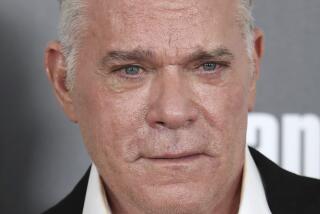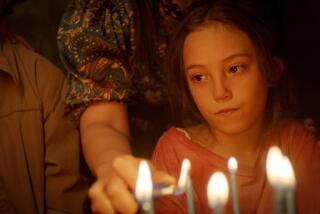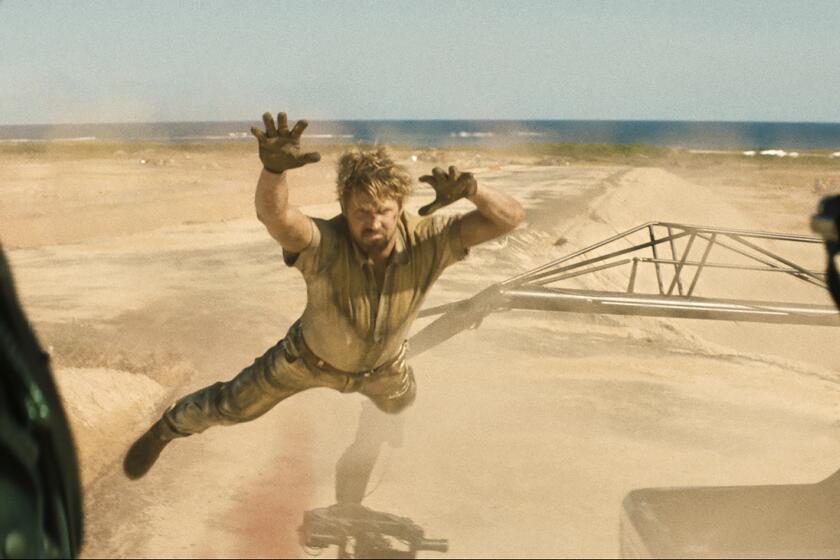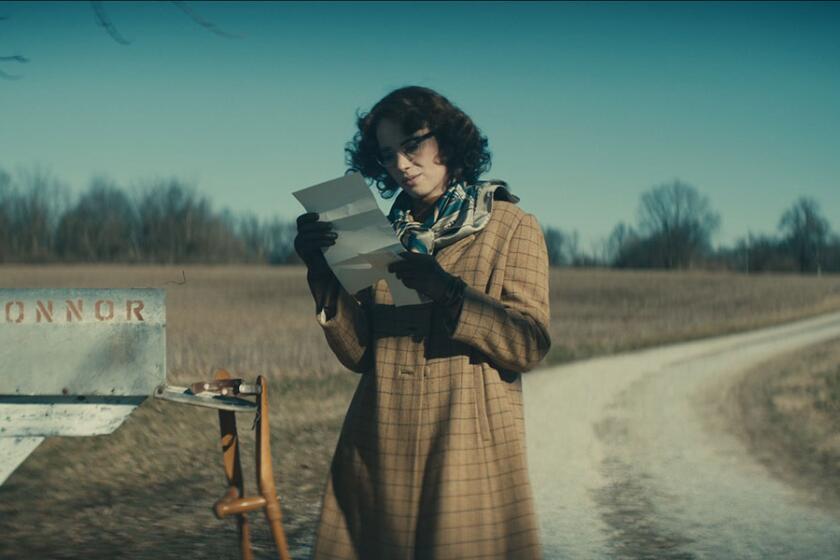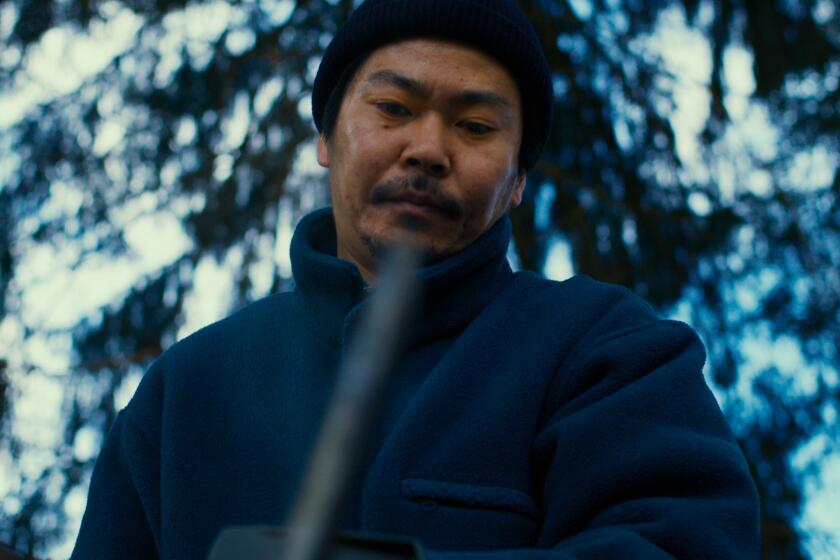Film Tells Story of the Slaying of Archbishop
Ellwood Kieser is the only producer in Hollywood who can get a laugh when he says, “How are you going to get into heaven if you don’t see my movie?”
That’s Father Ellwood Kieser, a priest with a long track record in Tinsel Town.
Kieser is the executive producer of “Romero,” due for nationwide release this week. It is believed to be the first theatrical film produced under the auspices of the Catholic Church.
But there is, he points out, precedent for the church’s involvement.
“Jesus told stories and parables,” explained Kieser, who lists some of Hollywood’s biggest stars as friends. “The way to tell stories and parables in 1989 is to make movies.”
“Romero” is the real-life story of Archbishop Oscar Romero, who was assassinated in El Salvador by a right-wing death squad in 1980 after speaking out against the Salvadoran government. Starring Raul Julia, the movie portrays Romero not as a superman, but as a frail, troubled man forced to make tough decisions, knowing his actions almost certainly would cost him his life.
“Romero” opens Friday in 32 cities. There will be a special screening of the film at the Park Theater, 7:30 p.m. Thursday to benefit the Catholic charities of San Diego. It opens an extended run at the Park on Sept. 15.
Promotional Tour
Kieser, in San Diego as part of a four-week promotional tour for “Romero,” is a member of the Paulist order, and the head of the nonprofit Paulist Pictures. Paulists seek to serve those outside the Catholic Church, including agnostics.
Kieser’s goal is to use popular media to bring spiritual enrichment to people, to produce shows with “human value.”
For 23 years, Kieser produced the Emmy-winning series “Insight” (now in reruns). In 1984, he branched into prime-time programming, producing the ABC special “The Fourth Wise Man,” followed by the 1986 movie of the week, “We Are the Children,” filmed in Kenya and starring Ted Danson and Ally Sheedy.
Kieser emphasized that “Romero” is not intended to preach or convert anyone to Catholicism, although it dramatically presents the story of brutal oppression in El Salvador, and the deaths of Romero and Father Rutilio Grande.
“We’re not doing a tirade here,” Kieser said. “You can’t miss the religious and political implications of the film. We’re doing a story of a man who grew from a mouse into a tiger.”
Kieser purposely enlisted non-Catholics to write and direct the film. Director John Duigan won five Australian Academy Awards for his “The Year My Voice Broke”; screenwriter John Sacret Young , a veteran of Hollywood, is executive producer and co-creator of the television series “China Beach.”
Some of the most gripping religious movies, including “A Man for All Seasons,” weren’t written by Catholics, Kieser pointed out.
“I didn’t want too much reverence” in the script, he said. “I wanted a touch of skepticism. I wanted human beings with some warts.”
Young and Kieser visited El Salvador in 1983. They met with a wide variety of people, including members of the military establishment. One member of the oligarchy chastised Romero for banning private baptisms.
“Imagine, our child being baptized with a bunch of Indians!” the man said, a line Kieser used in the film.
In El Salvador, Kieser said he witnessed the “best and worst” of man. He was inspired by the work of the priests and nuns, and the spirit and courage of the people. At the same time, he was horrified by the attitude of the repressive ruling regime.
“We knew we wanted to make the movie,” Kieser said, “but when we came back we knew we had to make the movie.”
During the trip, Kieser and Young visited a lava field used as a dumping ground for bodies by the death squads. They found mass graves with skeletons, picked clean by vultures, their thumbs still tied behind their backs by piano wire.
“That’s evil,” Kieser said. “That’s Nazi kind of evil.”
Originally, Kieser intended “Romero” to be a television “movie of the week.” But it was rejected by the networks, usually as too controversial, and Kieser was unwilling to compromise the concept.
He took the project to several of his Hollywood contacts, including David Puttnam, then head of Columbia Pictures, and Martin Scorsese. Kieser had met Puttnam at the 1982 Academy Awards, which he attended with actress Melinda Dillon, a friend.
Puttnam told Kieser he would have made the picture if he hadn’t recently made “The Mission,” which also had a religious theme. Scorsese and others either had prior commitments or problems with the concept.
Kieser said he took the problems as a sign from God and opted to make the film himself.
He raised money from several organizations, primarily Catholic charities such as the Raskob Foundation, the Paulist Fathers and the Los Angeles archdiocese. The American Catholic Bishops invested $288,000.
Actors Worked for Scale
The final budget was a relatively reasonable $3.5 million. All the actors worked for scale, except Julia, who accepted a fraction of his usual salary, Kieser said.
Realizing that filming in El Salvador was impossible, “Romero” was shot in Mexico, which also presented problems. Reportedly because of ties to the government of El Salvador, the Mexican military refused to cooperate. In order for the movie crew to create its own army, thousands of realistic-looking squirt guns had to be shipped to Mexico.
When released, “Romero” will certainly raise some controversy within the Catholic Church. The film raises the issue of “liberation theology,” priests advocating the end to a repressive government, often by invoking Marxist ideals. Priests who promote “liberation theology” often have been at odds with the Vatican.
Kieser quoted Romero on the topic of Marxism: “The real problem is not Marxism, it’s false Christianity,” he said.
Role of the Church
Besides showing a man rising above his own limitations and ego, Kieser said, the movie is about the role of the church in a repressive state, a “microcosm of the church really being the church,” being responsive to the poor and unfortunate, he explained.
“The church can’t be indifferent to what is happening,” Kieser said. “They have to say it is wrong, and they’re going to do whatever it takes to change it.
“It is easy to be patient when someone else is doing the suffering.”
The film is not a documentary, and it does use dramatic license to tell the story. Some parts are not completely accurate. Like almost any movie biography, scenes are created and juxtaposed in order to tell the story.
“Fidelity to the truth is paramount,” Kieser said. “You have to be faithful to the truth, and as dramatist you’re looking for the underlying truth.”
Although Kieser didn’t set out to portray Romero as a hero, that is how he is portrayed in advertisements for the movie, one of the few concessions Kieser has made to the commercial aspects of producing a film. Sounding very much like a Hollywood producer, Kieser said he didn’t depict “Romero” as a political film because people wouldn’t go to see it.
“Marketing emphasizes the part of truth that will bring people to the theater,” he said.
Kieser, who has several network television projects in development as well as a theatrical project about feminist Dorothy Day, wanted to emphasize the movie entertainment value, that, even with its religious and political overtones, it should be treated like any other theatrical release.
But there is a message in “Romero.” First and foremost, Kieser said, it is the story of a man who rose above his own fears and ego.
“I think people will come out of the theater full of something other than popcorn,” he said.
More to Read
Only good movies
Get the Indie Focus newsletter, Mark Olsen's weekly guide to the world of cinema.
You may occasionally receive promotional content from the Los Angeles Times.
